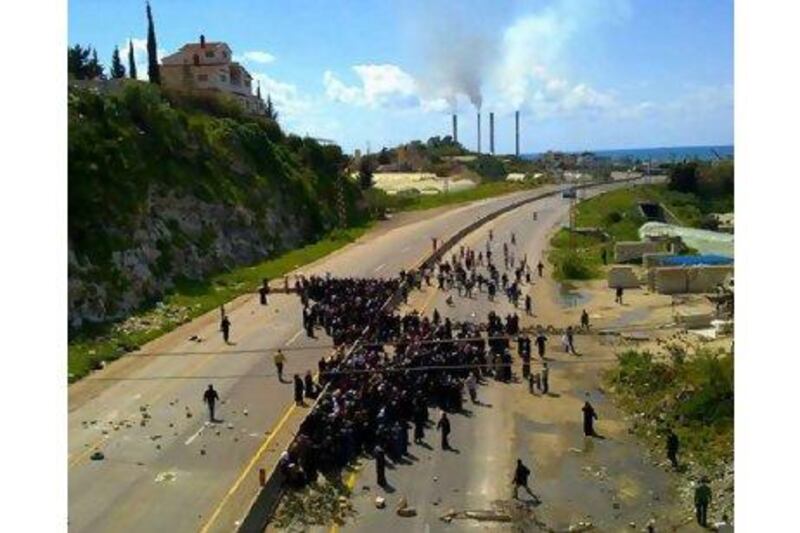Damascus // Hundreds of women protested on Syria's main coastal motorway yesterday, according to civil-rights activists, demanding the release of scores of men recently detained by security services.
The area between the cities of Latakia and Banias, on Syria's Mediterranean coast, has become a flashpoint for anti-government demonstrations and violent clashes involving security units.
On Sunday it was the scene of what the Syrian authorities say was a professionally organised ambush against the military, which left nine soldiers dead and dozens more wounded.
As many as 350 male residents of Baida, a small town on the outskirts of Banias, were subsequently arrested in a sweep by elite army units and secret police on Tuesday, for orchestrating anti-government protests, Syrian human-rights monitors said.
The government does not comment on such matters, but sources close to the authorities insist the arrests were made because some of the protesters had been carrying firearms.
Yesterday, the detainees' wives, sisters and daughters peacefully marched along the busy intercity motorway, calling for all of the men to be freed.
"They are trying to lift their voices to the government in the hope it will react positively and let the men go," said a civil-rights activist who was in touch with the group.
Military units were deployed to Banias at the weekend. Human-rights groups say that four civilians were killed by pro-government gunmen outside a mosque there on Sunday.
The authorities insist foreign-backed "terrorist" groups are now hijacking protests in Syria. In support of the claim, state-run television yesterday aired what it said were confessions by three Syrian men, who admitted they had been paid to stir up unrest and carry out armed attacks against protesters and security units.
Activists also said yesterday that students at Aleppo university staged a protest. Until now, Aleppo, Syria's second largest city, has been quiet.
As with much of the information coming out of Syria since protests began last month, the claims by pro- and anti-government sources cannot be independently verified, owing to media restrictions.
Elsewhere, attempts to defuse a weeks long crisis in the southern city of Deraa, continued, with a delegation from the city preparing to meet high-level government officials in Damascus. Meetings last month with ministers failed to prevent spiraling bloodshed in the city, 100km south of the capital, with scores of civilians killed there since an anti-government uprising began on March 18.
A source close to the Syrian authorities said the vice president, Farouk al Shara, met with a delegation from Deraa on Tuesday and heard a list of demands from them, in what may be preparation for a face-to-face audience with President Bashar al Assad. State media have not confirmed the meeting with the vice president did take place.
One of the complaints made by Deraa protesters is that those killed by government forces have not been treated with proper respect by the Syrian leadership.
Mr Assad has ordered an investigation into the deaths of civilians and members of the security forces in Deraa and Latakia, as well as tasking a committee to look at reforming emergency laws.
Ending the highly repressive state of emergency, which has been in place since 1963 and used to suppress opposition activists, is a major demand of protesters nationwide.
Unprecedented public dissent has snowballed in Syria since the first demonstrations took place in Damascus last month, involving a handful of people. While anti-government protests have spread across much of the country, the vast majority of Syrians have not taken part, neither have they joined in with pro-regime rallies.





